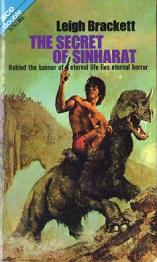
The Secret of Sinharat
Leigh Brackett
94 pages
published in 1964
Back when I was twelve I discovered a novel starring a brave Earthman transported to ancient Mars, a dying world of grand canals and encrouching deserts, populated by noble and barbarian races slowly sinking in decadence. I'm of course talking about Leigh Brackett's pulp Mars stories rather than Edgar Rice Burroughs Barsoom series, which I never read until much later. But that Leigh Brackett novel was my first exposure to both Brackett and that grand pulp idea of a dying Mars filled with ancient secrets and half forgotten ruins of a greater past. To this day I still like Brackett better than Burroughs, not just I encountered her first, but because she's the better writer.
If Leigh Brackett sounds familiar but you're sure you've never read any of her stories, it might just be because you remember her name from the credits of The Empire Strikes Back, the second and best Star Wars novel. You see, apart from writing some of the best pulp science fiction ever, Brackett also had a long and distinguished career as a Hollywood script writer, working on such movies like The Big Sleep, Rio Bravo and The Long Goodbye. But it's her science fantasy I like best.
Science fantasy is that subgenre of science fiction that has all the trappings of science fiction, --aliens, other planets, blasters and aircars -- but which actually read a lot like sword and sorcery in disguise, with strapping barbarian heroes fighting degenerate warlocks using superscience of an earlier age that they barely understand. It's very romantic, not very plausible or much concerned with realistic science. Science fiction in that grand pulp tradition of Edgar Rice Burroughs. And like Burroughs had his John Carter, Brackett has Eric John Stark, the outlaw with a twenty year Moonprison sentence on his head, raised by a strange non-human tribe on Mercury, (in)famous on three planets as a barbarian and renegade, but also as a man with his own code of honour.
Which is why Earth Police Control can use him for a little job when they finally got him cornered on Mars. Stark has been known to support native rebellions on Mercury, Venus or Mars before, when the cause was right and they know he has been invited to participate in one more. But this time the cause isn't just. Somebody is riling up several of the dryland Martian tribes for a holy war while gathering together some of the greatest villains in the Solar System together and it won't be for noble purposes. EPC needs Stark to infiltrate the rebellion to see what's going on and in return he'll get his freedom. Now Stark is of course the sort of man who'd only agree to such a deal if he thought what he would do was right, but knowing that one of the mercenaries involved is his old enemy Luhar the Venusian is enough for him; anybody who'd hire him is up to no good.
Stark is right to be suspicious. The leader of the uprising, barbarian chief Kynon of Shun is genuine in wanting to unite the dryland tribes to end the tyranny of the Martian city states which hord most of the scarce water away from his people. His lieutenants however, Delgaun of Valkis, who has hired Stark and the rest of the offworld mercenaries, and his companion Berild, are only using him to reach their own goal. They need him to unite the tribes using the old legend of the Ramas, which promised immortality through mind transfer and once the tribes had conquered the city states they planned to get rid of him.
Stark joins the rebels in one of the dangerous and degenerated lower canal cities, where a public demonstration of the Ramas mindtransfer technique is given. Stark denounces it later as hokery, which Kynon admits, but justifies as necessary to unite the tribes. Meanwhile Delgaun sets a trap for Stark using his old enemy Luhar, which fails. Only when a sandstorm hits them on their way to Kynon's desert headquarters do Delgaun and Luhar manage to leave Stark behind for dead. Delgaun's companion Berild however is accidentaly also left behind. Together they struggle through the Martian desert to the rendezvous at Sinharat. It's there that the secrets of Delgaun and Berild are revealed and Stark has to fight an ancient evil before it conquers Mars...
The Secret of Sinharat is very pulpy written, almost each scene an action scene with broadly sketched characters and a straightforward plot. What makes it is the atmosphere Brackett manages to evoke in this limited space. Her Mars is familiar to anyone who has read any of the Barsoom novels or their many imitators, but she manages to make it all sligthly more interesting and believable. What makes it different is that Brackett has transplanted the sort of colonial politics to Mars that e.g. the British dealt with in India, as seen in the setup of the story here, making it slightly less of a fantasyland than barsoom was... It's still very Orientalist of course, but how much does this matter in this kind of story?